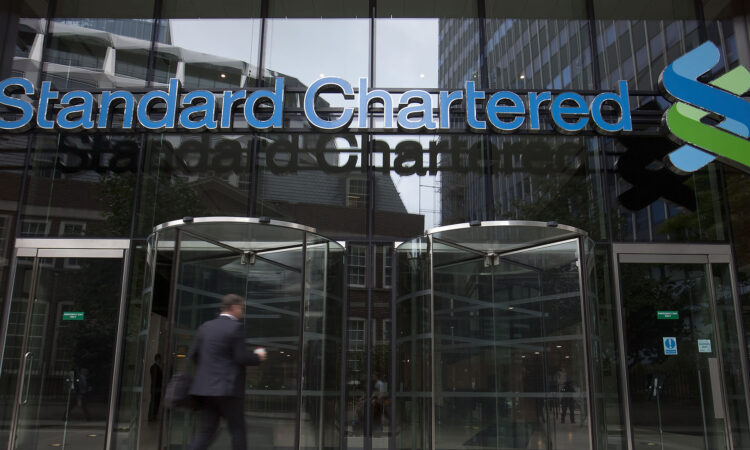Whistleblower accuses US of ignoring evidence Standard Chartered Bank served suspicious Iranian clients

A former Standard Chartered Bank executive said in a new court filing that U.S. authorities either overlooked or concealed crucial evidence showing the bank conducted many more transactions with sanctioned Iranian entities and terror groups than it admitted to when settling a criminal case in 2012.
Julian Knight, who headed a Standard Chartered transaction services unit from 2009 to 2011, said U.S. officials falsely denied he had provided the information when the Justice Department declined to intervene in his whistleblower claim against the bank.
Knight, who asked a U.S. federal court in New York to reinstate his claim, said that the government had committed a “colossal fraud” on the court by denying he had provided “damning evidence” that the bank “facilitated many billions of dollars in banking transactions for Iran, numerous international terror groups, and the front companies for those groups,” long after it claimed to have discontinued all Iranian operations in 2007.
He said the government either “lied that it had conducted ‘a lengthy, costly, and substantial investigation’ into his claims or it was “fully aware” of the transactions he had provided “and simply lied to conceal them.” He added: “The Government’s own statements support the latter scenario.”
“False declarations submitted to the Court by the Government thus corrupted the integrity of this judicial proceeding to its very core,” Knight’s motion said.

In 2012, Standard Chartered agreed to forfeit $227 million to the U.S. Justice Department for violating federal and state laws by illegally moving millions of dollars through the U.S. financial system between 2001 and 2007 on behalf of entities in Iran and other countries subject to U.S. economic sanctions. The settlements, known as deferred prosecution agreements, allowed the bank to avoid criminal charges in exchange for its commitment to stop processing transactions for sanctioned entities and implement a series of internal reforms. Since 2012, prosecutors have extended the agreements after finding additional wrongdoing. In all, the London-based bank has paid well over $1 billion to settle U.S. and U.K. charges it repeatedly breached sanctions by clearing millions of dollars for clients in Iran and several other sanctioned countries.
But Knight alleges he provided U.S. authorities with evidence of much more wrongdoing than the bank has acknowledged to date; he said authorities failed to act on it, then denied its existence to a court.
In his filing, Knight said the Standard Chartered transaction data he gave investigators in 2012 and 2013 contained a huge cache of hidden information that potentially revealed further evidence of sanctions violations. With the assistance of forensic data analysis, he said, his firm “was only recently able to reveal or ‘decloak’ countless illegal transactions that were hidden deep in the Bank’s electronic spreadsheets, which [he] gave to the Government … One cannot overstate the significance of that discovery.”
Among the files Knight provided to the government back then is evidence he said he recently “decloaked” showing that Standard Chartered continued to serve clients it called its “Iran Group” between 2008 and 2012. The clients included front companies for the Islamic Revolutionary Guard Corps, Hamas and Hezbollah, as well as Iran-related entities based in Kuwait, the United Arab Emirates, Germany and other countries. Knight alleges some of those transactions could have been conducted in breach of U.S. sanctions in place at the time and that the bank “earned jaw-dropping commissions for many of the cloaked transactions.”
“That sort of extreme profiteering is known as ‘gouging’ and is commonplace in transactions involving known terrorist organizations,” the court records said.
‘Hidden’ transactions
According to Knight, the U.S. government failed to identify at least 500,000 separate transactions, including some U.S. dollar-denominated foreign exchange transactions involving the bank’s Iran-related clients.” He said the records were hidden in 53 Microsoft Excel files that he gave the government and that government officials working for the FBI and other agencies failed to examine thoroughly. Knight claims the new findings show that the government made “false representations” when it told the court that Knight had not provided evidence of the bank’s dealings with Iran and international terror groups.
In an emailed response to questions from the International Consortium of Investigative Journalists, a Standard Chartered spokesperson said Knight’s filing was “another attempt to use fabricated claims against the bank, following previous unsuccessful attempts.”
“The false allegations underpinning it have been thoroughly discredited by the U.S. authorities who undertook a comprehensive investigation into the claims and said they were ‘meritless’ and did not show any violations of US sanctions,” the spokesperson said.
The Justice Department and the Federal Bureau of Investigations declined to comment on the case.
In an expert statement filed in support of Knight’s motion, David Scantling, a forensic analyst who examined the data, wrote that the previously hidden transactional records “revealed deeply troubling connections to sanctioned entities and terrorist organizations.” The data also showed that the “bank’s Iran Group not only continued to service existing Iranian clients but also onboarded new clients and developed new business opportunities in Iran.”
Scantling told ICIJ that the data he analyzed wasn’t immediately visible when the files were opened but that he had been able to retrieve it, and any user with access to the files could have done the same. The files contained transactional records that Standard Chartered employees had prepared for analysis by exporting the data from the bank’s internal systems into spreadsheets. Tables in the spreadsheets summarized the transactions, which were not immediately visible. Once extracted and made visible, those transactions contained details of multiple transactions, including foreign exchange transactions.
In 2019, U.S. authorities extended the settlement agreements previously reached with Standard Chartered and ordered the bank to pay additional fines after bank executives admitted they had violated Iranian sanctions from 2007 to 2011.
But at a separate 2019 hearing on the merits of Knight’s whistleblower suit, an FBI agent told a court that the government hadn’t used data provided by Knight in its investigation and that a review of all “hidden” information did not show any additional potential breaches of sanctions by the bank.
“[O]ur investigation concluded that SCB’s post-2007 transactions with [Iranian] entities which were referenced in [Knight’s] documents were either legitimate wind-down transactions that the Bank had previously …disclosed to DOJ and [the Treasury Department’s Office of Foreign Assets Control] or otherwise did not appear to violate any sanctions rules,” the FBI agent testified, according to court records.
However, Scantling, the forensic analyst, said in his brief that the hidden data in the bank files contained many transactions that the government missed.
For instance, it showed that the bank had provided “access to its online foreign exchange platform” for Iran-based entities, undermining “the effectiveness of international sanctions regimes and potentially enabled the financing of terrorist activities that threaten the lives of innocent civilians and military personnel,” Scantling’s statement said.
“The Newly Extracted Data simply cannot be reconciled with the Government’s representations to the Court in this matter that the [data provided by Knight] contains no evidence of undisclosed sanctions violations,” the statement said
Over a decade of legal battles
Knight, and Anshuman Chandra, another former Standard Chartered banker-turned-whistleblower, have brought repeated money laundering allegations against the bank over a decade. The U.S. government has declined to support their claims, and courts have dismissed them.
During the same period, however, the DOJ and other government agencies have pursued their own investigations and repeatedly charged Standard Chartered with violating anti-money laundering and terror financing laws in serving sanctioned Iranian clients.
Knight’s allegations, filed on May 31 in federal court in New York, are part of a motion to reconsider the court’s earlier dismissal of a case alleging Standard Chartered engaged in banking practices that violated U.S. sanctions against Iran.
Knight filed the case in the name of his Wyoming-based company, Brutus Trading LLC.
After reading about the settlement in media reports, Knight contacted the government claiming he had evidence showing that the bank’s “violations were far greater in number and nominal value than announced in the settlement,” according to court records.
That same year, Knight sued the bank on behalf of the U.S. government, a whistleblower complaint alleging that it had misled the officers and continued to engage in sanctions-violating activities beyond 2007. The government found Knight’s claims “unsupported” and decided not to intervene in Knight’s case, according to court records. Knight later dropped the case.
At the same time, however, the government continued to investigate Standard Chartered’s potential evasion of Iranian sanctions and, in 2014, it extended the bank’s deferred prosecution agreement. The authorities found that the bank “may have even committed additional sanctions violations.”
In 2018, Knight re-filed his whistleblower claim under the federal False Claims Act (FCA), also known as a Qui Tam suit, in which a private plaintiff sues in the public interest and seeks to enlist the government to join the claim. But the court again dismissed it because his “allegations did not lead to the discovery of any new FCA violations by defendants and were not the impetus for the 2013 Investigation,” the judge wrote in the decision to dismiss his case.
Still, the next year, the U.S. authorities found that, between 2007 and 2011, the bank had processed about 9,500 additional financial transactions worth approximately $240 million through U.S. financial institutions for the benefit of Iranian entities. The bank admitted to the allegations and agreed to pay $1.1 billion to U.S. and U.K. authorities and to an extension of the DPA until 2021.
Now Knight is challenging the court’s 2019 decision to dismiss his whistleblower complaint and is seeking to force the government to disclose all government officials’ statements and other evidence the court used to dismiss his case at the time.
In 2020, ICIJ’s FinCEN Files investigation based on confidential U.S. banking documents found that Standard Chartered and four other global banks kept profiting from powerful and dangerous players even after U.S. authorities fined these financial institutions for earlier failures to stem dirty money flows.
The investigation, led by ICIJ in collaboration with Buzzfeed News and 108 media partners, also found that U.S. agencies responsible for enforcing money laundering laws often failed to hold those banks accountable. Government agencies such as the DOJ, Treasury Department and others rarely prosecuted megabanks that break the law, and the actions authorities do take barely ripple the flood of plundered money that washes through the international financial system.
The DOJ’s reliance on deferred prosecution agreements, such as the one extended to Standard Chartered, and similar non-prosecution deals have come under increasing criticism from legal scholars and reform groups as offering only the appearance of accountability. Critics say DPAs allow institutions to escape criminal charges in return for a fine — as a legal form of pay-to-play — while allowing culpable executives to walk free. A 2022 ICIJ probe found that the deals, negotiated behind closed doors, have led to fines with no real deterrent effect and even encouraged corporate recidivism.
Banks have been among the more prominent of the beneficiaries of DPAs. Deutsche Bank escaped prosecution four times — on bribery, tax fraud and antitrust charges — and settled a fifth case with the U.S. Securities and Exchange Commission, the ICIJ report found. JP Morgan Chase settled five separate criminal cases, including for violations of antitrust, the Bank Secrecy Act, the Foreign Corrupt Practices Act, and for general fraud; UBS AG settled four criminal cases; HSBC Holdings PLC settled three separate criminal cases, including settlements that came after it admitted to helping transmit at least $881 million controlled by the notorious Sinaloa cartel and other Mexican drug gangs.





